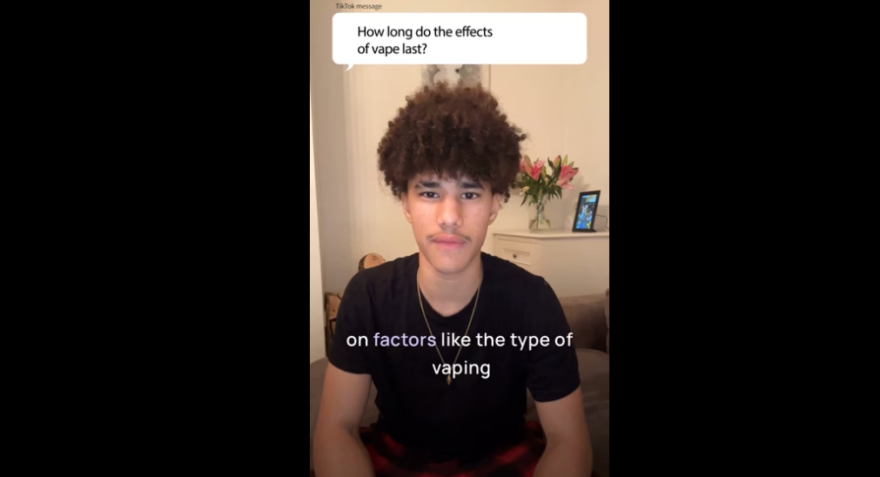The impacts of vaping on the body and mind
Vaping isn’t safe, far from it. For smokers it’s believed to be less harmful than cigarettes, but for smokers and non-smokers alike it’s still incredibly harmful.

What’s stopping you?
Not sure if you’re ready to stop smoking? Worried about finding it difficult?
Start the quizAs with cigarettes there is no high obtained from vaping – just the unpleasant physical feeling of your body taking in poison.
The damage to physical and mental health is significant.
A recent study by the CDC, or Centers for Disease Control and Prevention, (national public health institute in the United States) reveals that in the USA approximately 47% of children who have tried e-cigarettes have become addicted.
How long does it take for the vape to work?
Vaping doesn’t work and that is important.
Nicotine has an effect within a few minutes but remember, it’s not safe or cool, and the health effects do not end when you breathe it out – vaping can have serious long-term health consequences, so it’s best to steer clear.

Vaping doesn’t work and that is important.
Nicotine has an effect within a few minutes but remember, it’s not safe or cool, and the health effects do not end when you breathe it out – vaping can have serious long-term health consequences, so it’s best to steer clear.
What’s holding you back?
Not sure if you really want to quit vaping?
Want to stop, but concerned that you’ll find it tough?
Worried that you’ll be deprived for the rest of your life without vapes?
We know that taking the first step can be difficult, but we’re here to answer your questions in complete confidence – with no pressure and no judgement.
Start the free quizHow long do the effects of vape last?
The effects of vaping can vary depending on factors like the type of device, strength of nicotine in the juice, how much you’re vaping, and your own body.
However, you need to understand that there are no benefits to vaping and the health effects do not end when you breathe it out – vaping can have serious long-term health consequences. But generally, here’s how it works:
-
Immediate reaction
When you vape nicotine will enter the blood stream within a few minutes.
-
Short-term effects
Some short-term effects, like feeling lightheaded or dizzy, can kick in right after vaping and might last for a little while, maybe 10-15 minutes but remember that nicotine is highly addictive (more addictive than cocaine) and vaping can have long-term health consequences.
-
Longer-term effects
The longer-term effects can stick around longer, especially if you’re vaping regularly.
Things like coughing, trouble breathing, and changes in your taste or smell might hang around for days or even longer if you keep vaping.
-
Health risks
Plus, there are bigger health risks to think about. Vaping is addictive and can mess with your lungs, heart, and brain, and it might even up your chances of getting sick.
Those effects can stick with you for a long time, maybe even for life.

The effects of vaping can vary depending on factors like the type of device, strength of nicotine in the juice, how much you’re vaping, and your own body.
However, you need to understand that there are no benefits to vaping and the health effects do not end when you breathe it out – vaping can have serious long-term health consequences. But generally, here’s how it works:
When you vape nicotine will enter the blood stream within a few minutes.
Some short-term effects, like feeling lightheaded or dizzy, can kick in right after vaping.
They might last for a little while, maybe 10-15 minutes but remember that nicotine is highly addictive (more addictive than cocaine) and vaping can have long-term health consequences.
The longer-term effects can stick around longer, especially if you’re vaping regularly.
Things like coughing, trouble breathing, and changes in your taste or smell might hang around for days or even longer if you keep vaping.
Plus, there are bigger health risks to think about. Vaping is addictive and can mess with your lungs, heart, and brain, and it might even up your chances of getting sick.
Those effects can stick with you for a long time, maybe even for life.
How long do the effects of vape last?
The effects of vaping can vary depending on factors like the type of device, strength of nicotine in the juice, how much you’re vaping, and your own body.
However, you need to understand that there are no benefits to vaping and the health effects do not end when you breathe it out – vaping can have serious long-term health consequences. But generally, here’s how it works:
-
Immediate reaction
When you vape nicotine will enter the blood stream within a few minutes.
-
Short-term effects
Some short-term effects, like feeling lightheaded or dizzy, can kick in right after vaping and might last for a little while, maybe 10-15 minutes but remember that nicotine is highly addictive (more addictive than cocaine) and vaping can have long-term health consequences.
-
Longer-term effects
The longer-term effects can stick around longer, especially if you’re vaping regularly.
Things like coughing, trouble breathing, and changes in your taste or smell might hang around for days or even longer if you keep vaping.
-
Health risks
Plus, there are bigger health risks to think about. Vaping is addictive and can mess with your lungs, heart, and brain, and it might even up your chances of getting sick.
Those effects can stick with you for a long time, maybe even for life.
What are the side effects of vaping for teens?
Short-term side effects
-
Cotton mouth and always feeling thirsty
Vaping can dehydrate you and leave your mouth feeling really dry. It’s because of an ingredient called propylene glycol in the vape juice.
-
Throat irritation and coughing fits
Inhaling hot vapour can tickle your throat making you cough like crazy and get short of breath. Not good.
-
Developing nicotine addiction
Nicotine is highly addictive. Even if you think you’re vaping “nicotine-free” juice, turns out it might still have nicotine in it. And that stuff’s super addictive, leading to major cravings and withdrawal when you do try to quit (unless you use the right method).
-
Increased heart rate and blood pressure
Nicotine in vapes can amp up your heart rate and blood pressure, especially risky if you’ve got heart issues.
Long-term side effects
The long-term effects of vaping are still being researched but emerging evidence suggests potential risks associated with prolonged use:
-
Messing up your lungs / Respiratory issues
Vaping isn’t just harmless water vapour.
The stuff in those clouds can mess with your lungs, causing issues like asthma, bronchitis, and even chronic obstructive pulmonary disease (COPD) down the line.
This is because once heated the vapour contains really small particles which can be inhaled into the lungs.
-
Screwed-up lung development
If you’re still young, vaping could stunt your lung growth, leaving you with damaged lung health for life.
-
Lung inflammation and damage
The American Lung Association has stated that the inhalation of harmful chemicals [from vaping] can cause irreversible lung damage and lung disease such as lipoid pneumonia and vaping-associated lung injury (EVALI).
-
Heart problems on the horizon
Some studies say vaping could up your chances of having a stroke or heart attack.
-
Flavourings, Popcorn lung & lung damage
The flavours in vapes may seem harmless, but some can contain nasty chemicals that mess up your lungs, even causing a scary condition called “popcorn lung”.
The chemical that causes popcorn lung is banned in the UK, US & EU but is still used in illegal vapes and in flavours in the rest of the world.
-
Toxic metal and cancer causing chemicals
Vape juice is loaded with all sorts of chemicals (over 80 different ones), including cancer-causing ones and toxic metals like nickel and lead.
Definitely not stuff you want to be breathing in!
-
Ingredients not meant to be breathed into your lungs
Not one of the four main ingredients in vapes (propylene glycol, vegetable glycerin, nicotine and any number of different flavourings) are designed to be breathed into your lungs.
-
Mental health effects
Vaping has been increasingly linked to adverse mental health among adolescents and young adults. Read more on the effects of vaping on mental health
So, bottom line: Vaping might seem like an innocent, fairly harmless thing to do, but it’s seriously not worth wrecking your health over. Stay smart and stay away from vapes.
Effects of vaping on mental health
Vaping, particularly involving nicotine and THC, has been increasingly linked to adverse mental health outcomes, especially among adolescents and young adults.
Research indicates that vaping can make worse the symptoms of anxiety and depression and is associated with higher risks of suicidality.
A significant proportion of young people have reported using vaping as a coping mechanism for existing mental health issues, not recognizing that it could potentially worsen their conditions.
Nicotine, which is in nearly all vape juices, is highly addictive and can impact brain regions associated with mood regulation.
This may lead to increased impulsivity, mood disorders, and an altered stress response, potentially heightening the users’ sensitivity to stress over time.
There’s also evidence suggesting depression and vaping are linked with vaping making depression worse.
Is vaping safer than smoking for teens?
So, for smokers it’s believed that vaping is less harmful than cigarettes, but for smokers and non-smokers alike vaping is still incredibly harmful and definitely something to be avoided at all costs.
Some people say that for smokers vaping is kind of like falling from the 10th floor of a building instead of the 20th floor – you’re still in peril either way.
Recent studies also strongly suggest that vaping is a gateway to smoking for young people.
Why wait to quit vaping?
Our online video programme is tailored for teens, offering a powerful and supportive way to stop for good.
Buy now for just US$10






